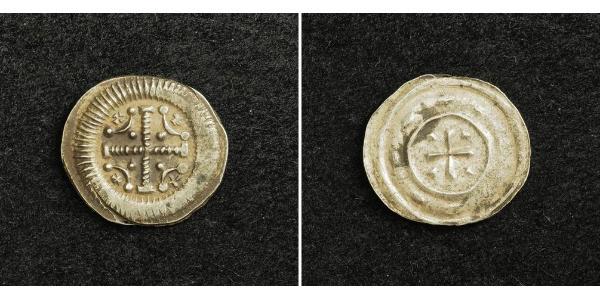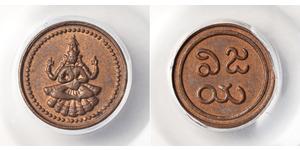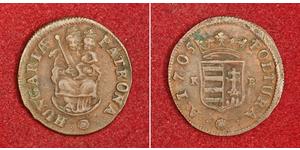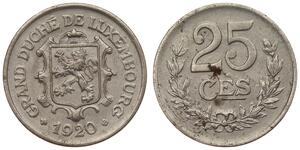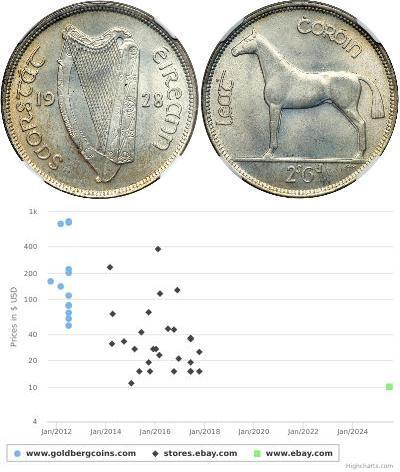(sold for $43.0)
1250, Kingdom of Hungary, Anonymous Coinage. Mediaval Silver Denar Coin. aXF!
Region: Hungary
Condition: About XF!
Reference: Huszar 92.
Mint Period: 12th Century
Denomination: Denar - Anonymous Coinage without ruler's and mint name!
Diameter: 12mm
Material: Silver
Weight: 0.67gm
Obverse: Cross with four crescent-like bars teminated by pellets. Four tiny crosses within crescents. All within a thick border.
Reverse: Cross with triangles in fields within double-circle. Bars between circles.
Bid with confiedence!
Bea IV (Hungarian: IV. Bea, Slovak: IV. Belo, maybe from slavic "belyj" - white) (29 November 1206 - 3 May 1270), King of Hungary (1235-70) and of Croatia (1235-70), duke of Styria 1254-58. One of the most famous kings of Hungary, he distinguished himself through his policy of strengthening of the royal power following the example of his grand father Bela III, and by the rebuilding Hungary after the catastrophe of the Mongolian invasion in 1241. For this reason he was called by the Hungarians "the second founder of our country".
Bea was the eldest son of King Andrew II of Hungary and his first wife, Gertrude of Merania. Upon Pope Innocent III's request, the ecclesiastic and temporal dignitaries of the Kingdom of Hungary took an oath before his birth that they would accept him as his father's successor.
The infant Bea was probably present when a group of conspirators murdered his mother on 28 September 1213. Following the murder, his father ordered only the execution of the conspirators' leader and forgave the other members of the group, which resulted in Bea's emerging antipathy against his father.
In the beginning of 1214, Bea was engaged to a daughter of Tzar Boril of Bulgaria. Shortly afterwards, he was crowned junior king. When his father left for a Crusade in August 1217, his maternal uncle, Archbishop Berthold of Kalocsa took Bea to the fortress of Steyr in Styria and he returned to Hungary one year later, following his father's return from the Holy Land.
In 1220, Bea married Maria Laskarina, a daughter of the Emperor Theodore I Laskaris of Nicaea and his father entrusted him with the government of Slavonia. However, King Andrew II, who had arranged Bea's marriage during his return from the Crusade, persuaded Bea to separate from his wife in 1222. Pope Honorius III, however, denied to declare their marriage null and void; therefore Bea took back his wife and escaped to Austria fearing his father's anger. Finally, King Andrew II made an agreement with his son with the mediation of the Pope and Bea took over again the government of Slavonia, Dalmatia and Croatia.
As governor, Bea began, with the authorization of the Pope, to take back the royal domains that King Andrew II had granted to his partisans during the first half of his reign. He laid siege to Klis, the fortress of a turbulent Croatian baron who had to surrender.
In 1226, his father entrusted him with the government of Transylvania where he assisted the missionary work of the Blackfriars among the Cuman tribes who settled down in the territories west of the Dniester River. As a result of their missionary work, two chieftains of the Cumans, Bartz and Membrok were baptized and they acknowledged Bea's overlordship around 1228. In the meantime, Bea began to organise the Banat of Szore©ny, a march of the kingdom.
In 1228, he began to revise his father's "needless and fruitless" donations in the whole territory of the kingdom with the authorisation of his father. However, his military failure in Halych, when assisting his younger brother, Andrew, weakened his influence and King Andrew II put an end to the revision of his former donations. During the early 1230s, Bea took part in the military expeditions of his father against Halych and Austria.
His relation with his father became even worse when King Andrew II married, on 14 May 1234, Beatrice D'Este, who was thirty years his junior.
When his father died on 21 September 1235, Bea ascended the throne without any opposition and Archbishop Robert of Esztergom crowned him on 14 October in Szekesfehervar. Shortly afterwards, he accused his young stepmother and his father's main advisor, Denis, Apud's son of adultery and ordered their arrest.
Bea's main purpose was to restore the royal power that had weakened during his father's rule; e.g., he ordered the burning of his advisors' seats, because he wanted to force them to stand in the presence of the king. As he also wanted to strengthen the position of the towns, he confirmed the charter of Szekesfehervar and granted new privileges to several key towns in the kingdom (Pest, Nagyszombat, SelmecbÃÆ'ƒÂ¡nya, Korpona, Zolyom, Bars, and Esztergom).
He sent Friar Julian to find the Magyar tribes who had remained in their eastern homeland. Friar Julian, after meeting with the eastern Magyars returned to Hungary in 1239 and informed Bea of the planned Mongol invasion of Europe. Bea wanted to take precautions against the Mongols; therefore he granted asylum, in Hungary, to the Cumans who had been defeated by the Mongols. However, the nomadic culture of the Cumans caused tensions between them and the Hungarians which became more and more acute.
Bea tried to reinforce the eastern borders of his kingdom, but the Mongol troops, led by Batu Khan, managed to break through the frontier defenses on 12 March 1241. On hearing of the Mongols' successful attack, the citizens of Pest, who had been accusing the Cumans of cooperating with the Mongols, murdered KÃÆ'ƒÂ¶ten, the Khan of the Cumans; therefore the enraged Cumans began to plunder the countryside and they left the country.
After the Cumans' departure, Bea could lead only a small army against the Mongols who defeated him in the Battle of Mohi on 11 April 1241. After his disastrous defeat, Bea fled to Pozsony and then to Hainburg where Duke Frederick II of Austria seized his treasury and enforced him to cede three western counties of his kingdom to Austria.
Bea fled from Hainburg to Zagreb and he sent his envoys to the Emperor Frederick II and Pope Gregory IX to seek their assistance against the Mongols. He even offered to accept the overlordship of the Holy Roman Emperor in case he sent troops to Hungary, but none of the Western powers provided him any assistance.
In the meantime, the Mongols were plundering the territories of the kingdom west of the Danube River. Moreover, in January, they could cross the frozen Danube and Bea had to flee from the Mongol troops, the khan sent to capture him into Croatia. Tatars under the leadership of Kadan believed that the king was hiding in the Klis Fortress. They attacked it in March 1242, and experienced a major failure. But when they learnt that the king was not there, they abandoned their attack on the fortress, and ascending their mounts rode of in the direction of Trogir. All the same, number of them turned toward Split.
The Mongols attacked the Dalmatian cities for the next few years but eventually withdrew without major success, as the mountainous terrain and distance were not suitable for Mongol warfare. After failure against Croatian soldiers, Mongols retreated and Bea IV awarded Croatian towns and nobility. Anyway, much of Hungary and Croatia was plundered by the Mongols, but without any major military success.
Following the Mongol invasion of Hungary, Bea broke with his former internal policy. Based on the experiences of the occupation, he began to grant estates to his partisans, but simultaneously he also obliged them to build up fortresses there, because only fortresses could resist the conquerors. He also encouraged the towns to protect themselves by erecting walls. He called back the Cumans to Hungary and granted them the deserted territories between the Rivers Danube and Tisza.
Because of his successful internal policy, he is greatly respected in Hungary and commonly known as "the second founder" of the kingdom.
Already in 1242, he could lead his troops against Duke Frederick II of Austria. During his campaign, he managed to reoccupy Sopron and Koszeg and he compelled the duke to renounce the three counties he had occupied during the Mongol invasion.
On 30 June 1244, Bea made a peace with the Republic of Venice and he surrendered his supremacy over Zadar (then called Zara) but he retained the 1/3 of the Dalmatian city's revenues of customs. In 1245, Bea provided military assistance to his son-in-law, Prince Rostislav against Prince Danylo of Halych, but the latter forced back the pretender's attacks.
Upon his request, Pope Gregory IX absolved Bea of his oath he had taken to the Holy Roman Emperor during the Mongol invasion on 21 August 1245. Shortly afterwards, Duke Frederick II of Austria, who did not give up his claims to the western counties of the Kingdom of Hungary, launched an attack against Hungary. Although, he could defeat the Hungarian troops in a battle by the Leitha River, but he died in the battle. With his death, the male line of the House of Babenberg became extinct, and a struggle commenced for the rule over Austria and Styria.
Bea granted the Banat of Szore©ny to the Knights Hospitaller in 1249, when a rumour was spreading that the Mongols were preparing a new campaign against Europe. In the same year, he assisted again his son-in-law against Halych, but Prince Danylo defeated his troops by the San River. Finally, Bea decided to make an agreement with the Prince of Halych and they had a meeting in Zolyom in 1250 where Bea promised that he would not assist his son-in-law against Prince Danylo.
Bea decided to intervene in the struggle for the inheritance of the House of Babenberg and arranged a marriage between Gertrude of Austria, the niece of the deceased Duke Frederick II of Austria, and Roman Danylovich, a son of Prince Danylo of Halych. In 1252, he led his armies against Austria and occupied the Vienna Basin. However, King Ottokar II of Bohemia, whose wife was Margaret, the sister of Duke Frederick II, also declared his claim to the two duchies. Bea made a campaign against Moravia but he could not occupy Olomouc; therefore he started negotiating with the King of Bohemia with the mediation of the Papal legates. Finally, Bea had a meeting with King Ottokar II in Pozsony and they concluded a peace. Based on the provision of the peace Wiener Neustadt and the Duchy of Styria came under Bea's rule.
Bea lost his favourite son in the summer of 1269. Afterwards, his favourite daughter, Anna exercised more and more influence over him. In his last will, Bea entrusted his daughter and his followers to her son-in-law, King Otakar II of Bohemia, because he did not trust his son.

|
Posted by:
anonymous 2014-05-01 |
One of them is

